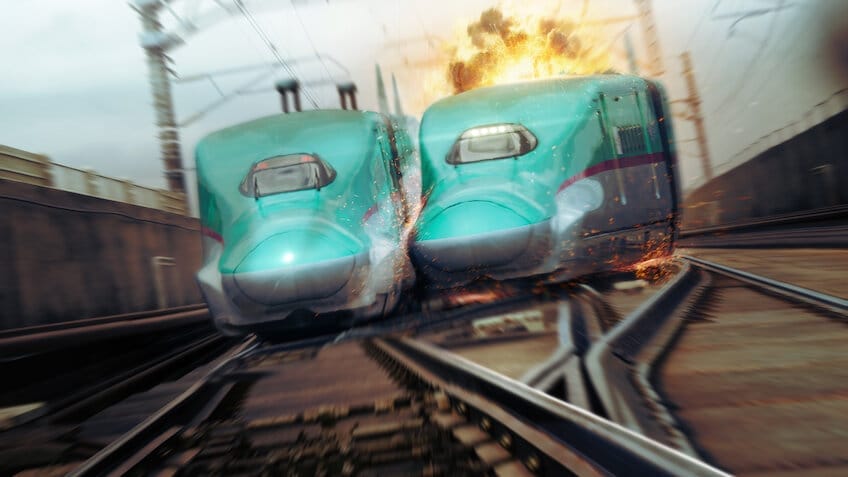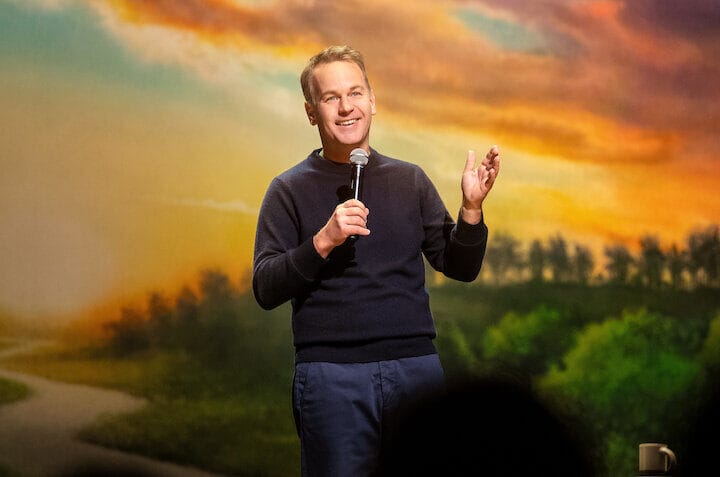Bullet Train Explosion (新幹線大爆破 in Japanese) is a gripping Japanese action thriller directed by Shinji Higuchi, the visionary filmmaker behind the acclaimed Shin Godzilla. This film offers a modern reimagining of the 1975 Japanese classic The Bullet Train (Shinkansen Daibakuha). That original film served as inspiration for the 1994 Hollywood hit Speed. Bullet Train Explosion plunges audiences into a terrifying scenario: a state-of-the-art Shinkansen hurtling towards Tokyo with a bomb aboard, programmed to detonate if the train dares to slow down.
Bullet Train Explosion is a remake that refuses to be just a mere remake, delving into social conflicts and modernizing the 1975 classic.
However, politicians don’t fare well in this film.
Non-Stop to Danger: The High-Stakes Plot
Tension ignites with a chilling phone call to the Shinkansen General Operation Control Center. An anonymous caller, their voice masked by a modulator, reveals a deadly secret: a bomb has been planted aboard the Hayabusa No. 60 bullet train en route to Tokyo. The stakes are immediately clear and terrifyingly high: the device is set to explode instantly if the train’s speed drops below 100 kilometers per hour.
Maintaining such high speeds on complex rail networks presents immense challenges, demanding impeccable coordination for track clearance, signal management, and navigating potential obstacles, making any necessary maneuvers, such as emergency track changes, incredibly dangerous.
To avert catastrophe, the terrorist demands an astronomical ransom: 100 billion yen (approximately equivalent to 670 million US dollars at typical exchange rates). This immense sum adds another layer of complexity, creating friction between the immediate need to save lives and the government’s stance against negotiating with terrorists. The scale of the demand transforms the incident from a hostage crisis into a national emergency, likely fueling the bureaucratic conflicts that arise. To underscore the gravity of the threat, the terrorist demonstrates their capability by detonating explosives on a separate freight train.
What follows is a desperate, last-minute battle against the clock. The train crew, terrified passengers, dedicated railway workers on the ground, police forces, and government officials must collaborate—and sometimes clash—in a frantic effort to find the terrorist, defuse the device, and keep the train above the critical speed, all before it reaches its final destination.
Of course, amidst the journey, we have a surprise that will change the train’s fate.
All Aboard: The Ensemble Cast
Aboard the speeding Hayabusa No. 60, the core crew faces the immediate crisis. Tsuyoshi Kusanagi plays Kazuya Takaichi, the duty-bound conductor striving to maintain order and calm among the increasingly terrified passengers. Working alongside him are driver Keiji Fujii, played by Kanata Hosoda, and engineer Chika Matsumoto, played by Non, visibly feeling the immense pressure.
The passenger list represents a cross-section of society trapped together. Machiko Ono portrays Yuko Kagami, a disgraced politician whose past or connections might influence the unfolding events. Jun Kaname plays Mitsuru Todoroki, a pompous influencer and entrepreneur who controversially attempts to crowdfund the massive ransom. Hana Toyoshima plays Yuzuki Onodera, a high school student on a field trip, representing the innocent lives caught in the balance. Adding to the mix are characters like the mysterious Goto (Satoshi Matsuo), whose significance is revealed later, and other passengers, including criminals, creating a microcosm of society under duress.
Meanwhile, the tension is just as high at the Shinkansen General Operation Control Center. Takumi Saitoh plays General Commander Yuichi Kasagi, leading the official response effort. However, his team faces internal conflicts, clashing with Hayashi (Daisuke Kuroda), a government official from the Prime Minister’s office, over the best course of action. This bureaucratic friction, with politicians potentially weighing political advantages while lives hang in the balance, acts as a significant obstacle, slowing down critical decision-making in a situation where every second counts. This dynamic, where internal bureaucracy becomes a secondary antagonist hindering the response to an external threat, echoes director Higuchi’s exploration of systemic challenges in Shin Godzilla.

Unprecedented Realism: Filming on the Shinkansen
One of the most talked-about aspects of Bullet Train Explosion is its remarkable commitment to realism, achieved through unprecedented cooperation with the East Japan Railway Company (JR East). This collaboration stands in stark contrast to the production of the original 1975 film, which received no such support from the national railway company at the time. This ambitious undertaking was highlighted as part of Netflix Japan’s 10th-anniversary celebrations, showcasing the streamer’s capability to mount authentic, large-scale local productions.
The production team was granted extensive access to JR East’s assets. They utilized real Shinkansen bullet trains and actual railway facilities, including stations, depots, and operational control rooms, for filming. In a remarkable logistical feat, the team chartered an entire Shinkansen train, filming on it while it was in motion seven times during round trips between Tokyo and Aomori. This use of real, moving trains significantly enhances the sense of speed and authenticity. The collaboration extended beyond access; JR East employees provided detailed notes and advice to the cast on how to accurately portray railway personnel, down to the precise angle of bowing to customers.
Adding another layer of authenticity, the production reportedly incorporated footage of the ALFA-X, a real experimental Shinkansen model used for testing on the Tohoku line. For the numerous scenes set inside the train, two full-scale bullet train cars were meticulously constructed, replicating authentic interior details, from seat materials to wall signage.
While prioritizing practical elements, the film also employs sophisticated effects work. For the crucial explosion sequences, the team opted for a large 1/6 scale train model, significantly bigger than the typical 1/20 scale used in miniatures. This larger scale required greater distances to achieve speed and necessitated faster camera movements but resulted in more intense and convincing explosion visuals. This dedication to practical effects, which even drew special effects professionals to witness the live model work, reflects Higuchi’s expertise and a desire for tangible weight in the spectacle. These practical elements were then seamlessly integrated with cutting-edge visual effects to enhance the overall realism.
This extensive cooperation with JR East carries symbolic weight beyond its practical advantages. The Shinkansen is an icon of Japanese innovation and efficiency. Filming a disaster scenario involving these trains signifies a remarkable level of trust and partnership between the filmmakers and the railway company, granting the film unique visual authority grounded in Japan’s actual infrastructure. Principal photography for the film took place entirely in Tokyo, Japan, commencing in September 2024 and concluding in November 2024.
Higuchi’s Touch: Spectacle and Human Drama
Shinji Higuchi directs Bullet Train Explosion, a director renowned for his ability to skillfully merge large-scale spectacle with compelling human drama and procedural detail. His work on Shin Godzilla, which masterfully balanced kaiju destruction with the complexities of bureaucratic response, established a distinctive directorial style. He brings a similar sensibility to this film, focusing on the intense struggles and difficult decisions faced by ordinary and extraordinary people thrust into extreme circumstances.
Higuchi is a lifelong admirer of the 1975 original The Bullet Train, citing it as a film that deeply impacted him during his youth. His goal was not simply to replicate the original but to “boldly reconstruct” the story for a contemporary audience, creating a modern “panic and suspense thriller.” A key element of this reconstruction was shifting the primary narrative focus. While the 1975 film centered on the dynamic between the police and the terrorists, Higuchi chose to place the train conductor, Kazuya Takaichi, and the control room staff at the heart of the story. This decision reframes the film, bringing it closer to a disaster procedural centered on the responders and those directly affected, rather than a traditional crime thriller focused on the chase.
This approach aligns with Higuchi’s consistent thematic interests: exploring societal and systemic responses to crises, the friction between operational necessity and bureaucratic hurdles, and the power of collective action. Bullet Train Explosion addresses themes of teamwork under pressure, the value of competence, and the complex moral dilemmas that arise when lives are at stake. Despite the dire circumstances, some critics note that the film maintains an “unwavering faith in people’s capacity for good.”
The film also marks a significant reunion between Higuchi and lead actor Tsuyoshi Kusanagi, who previously collaborated on the 2006 disaster film Doomsday: The Sinking of Japan. Higuchi has praised Kusanagi’s development as an actor in the intervening years, noting the added depth he brings to the role of the beleaguered conductor. Acknowledging the film’s title, Higuchi also confirmed that while the plot centers on preventing an explosion, he and the screenwriters deliberately worked to incorporate explosive moments to satisfy audience expectations.
Echoes of the Past: A Classic Reimagined
Bullet Train Explosion arrives with a significant cinematic legacy. It is a direct remake of the 1975 Japanese thriller The Bullet Train (Shinkansen Daibakuha), directed by Junya Sato and produced by the famed Toei Company. That film, starring Japanese screen legends Ken Takakura and Sonny Chiba, was itself a product of the global disaster film trend of the 1970s but became a classic in its own right.
Its influence spread internationally, notably serving as the acknowledged inspiration for the 1994 American action hit Speed. This connection creates a unique situation where the 2025 remake is inevitably compared not only to its Japanese predecessor but also to the more globally famous Hollywood film it originally inspired. Much of the initial online reaction immediately draws parallels to Speed, sometimes overlooking the remake’s actual lineage. This “Speed Paradox” means the film navigates a complex web of audience expectations, potentially caught between the gritty tone of the original and the high-octane action associated with its Hollywood descendant.
Higuchi’s stated goal was to modernize the story, evident in the updated speed threshold and the integration of modern technology and filmmaking techniques.
Our Take
Bullet Train Explosion is a modernized remake and, at the same time, a clear homage to the 1975 film. From the cinematography to the narrative, everything has a retro and nostalgic feel. That said, it doesn’t lose action and surprises.
The movie takes a turn halfway through and goes from being a simple remake to another film. We liked the twist where young actress Hana Toyoshima has a lot to say (we won’t give more hints or spoilers). The twist is surprising and revives the story, which ties into the 1975 film in a plot twist that is pleasing.
And, how could we avoid it, the film has a social commentary: politicians are presented, regardless of their party or ideology, as soulless and conscienceless beings willing to sell anyone out for votes. Could it be a coincidence?
MCM is a magazine in 16 languages, and we read articles, watch movies, and comment on exhibitions from around the world. And it seems this opinion about politicians extends internationally, regardless of the country or continent.
As for the film, it’s an entertaining thriller to enjoy on Netflix starting today.
Very entertaining.
Enjoy it.
Where to Watch “Bullet Train Explosion”












